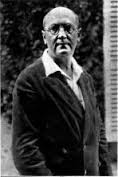Georges Duhamel
Georges Duhamel Poems
YOU cannot gather up my look, which flows
Towards the earth, and which you seek in vain;
Friend, let it weigh down, and yourself be silent,
...
O HAPPY feelings coming from outside,
You have so deeply driven into my soul,
You give me the illusion
...
Georges Duhamel Biography
Georges Duhamel was born in the thirteenth arrondissement of Paris on 30 June 1884. He was the third child of a family which struggled to survive on the income of his unstable father. The strains and tensions of these early years are reflected in his famous autobiographical novel,"Le Notaire du Havre" (1933), the first book of his Pasquier saga. In spite of this childhood disrupted by numerous crises, which on far too many occasions caused the Duhamel family to relocate abruptly, Georges nonetheless passed his baccalaureate in 1902. His first choice of career was to become a doctor, although he had a great love of literature and the arts and continued to pursue these interests also. Between 1906 and 1909 he founded an artistic community l'Abbaye de Créteil with Charles Vildrac (who would become his brother in law). The group brought together poets, writers, musicians and painters. From 1912, he became an editor of the literary review Mercure de France. In 1935, he took over the direction of the review and its publishing house. In 1937, he was elected to the French Académie Nationale de Médecine. In 1938, because of Duhamel's anti-war stance, he was replaced by Jacques Bernard, but Duhamel returned to directing the Mercure de France publishers in 1945 (he was majority stock-holder of the company). When the First World War was declared, Duhamel signed up and worked as an army surgeon for four years, often in dangerous situations. This painful experience provided the subject matter for two narratives which brought him immediate success, Vie des martyrs and Civilization (which won him the Prix Goncourt in 1918). Once he returned to civilian life, Duhamel dedicated himself to literature and defending human civilisation. In 1919, he found two spots in the Val-d'Oise where he would henceforth spend his summers (Sausseron Valley and Valmondois). In 1935, Duhamel was elected to the 30th chair at the Académie française. Between 1930 and 1940 he traveled to many conferences in France and abroad, speaking brilliantly of French language and culture as well as promoting the idea of a civilisation built on the human heart rather than technological progress. During the Second World War, Duhamel's work was banned by the Germans. He showed courage in his opposition to the occupation and the Petainist faction of the Académie française, later receiving public praise from Général de Gaulle. After the war, Duhamel was named president of the Alliance française and returned to public speaking on French culture. He built up numerous schools of the Alliance. Duhamel's health deteriorated from 1960 and he reduced his activities. He died in Valmondois on April 13, 1966.)
The Best Poem Of Georges Duhamel
The Beggar
YOU cannot gather up my look, which flows
Towards the earth, and which you seek in vain;
Friend, let it weigh down, and yourself be silent,
I have no wish nor strength to look at you.
You come to me, as men come near a hearth,
Frightened by the hush of your domain,
Preyed on by poverty and pain ...
But, just to-day, I know not what to give you,
I surely cannot give you what you ask.
Then you speak, accuse yourself,
You make your weakness more, you bare yourself before me,
Lessen yourself in hope
That I shall with a word restore your stature,
Make you bound upwards to the height you had,
Console you, and protest,
- With but one word, like a caress,
With but one word, though whispered.-
You shrink, you grovel on the ground,
You say yourself more lamentable than you are,
To force me to bend down and raise you up.
- One does this for the puniest stranger,
I could not fail to do it ... you are sure?-
... You dig your past up with a pitiless hand,
Confessing wrongs that you have done to me
Which I had no idea you had done,
Denying with uneasy, fainting voice,
All your mind's best.
But vainly you are looking for my eyes ...
I am tired, do you not know it?
O! say no more! for I would give a day of joy
To have the courage, friend, to throw to you
The word which should restore your strength and stature.
But, friend, the more your voice shakes and the more you lower yourself,
The more the wish of speaking to you flees from me,
And because you are a man, because I love you,
I long to weep at all I hear you say.
translated by Jethro Bithell
